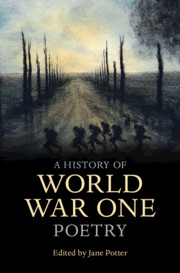Book contents
- A History of World War One Poetry
- A History of World War One Poetry
- Copyright page
- Dedication
- Contents
- Illustrations
- Contributors
- Acknowledgements
- Introduction
- Part I Literary Contexts
- Part II Nations and Voices
- Part III Poets
- Chapter 20 Non-Combatants
- Chapter 21 Edward Thomas (1878–1917)
- Chapter 22 Guillaume Apollinaire (1880–1918)
- Chapter 23 Siegfried Sassoon (1886–1967) and Edmund Blunden (1896–1974)
- Chapter 24 Anna Akhmatova (1889–1966)
- Chapter 25 Mary Borden (1886–1968)
- Chapter 26 Georg Trakl (1887–1914)
- Chapter 27 Isaac Rosenberg (1890–1918)
- Chapter 28 Ivor Gurney (1890–1937)
- Chapter 29 Wilfred Owen (1893–1918)
- Chapter 30 David Jones (1895–1974)
- Part IV
- Bibliography
- Index
Chapter 22 - Guillaume Apollinaire (1880–1918)
from Part III - Poets
Published online by Cambridge University Press: 18 January 2023
- A History of World War One Poetry
- A History of World War One Poetry
- Copyright page
- Dedication
- Contents
- Illustrations
- Contributors
- Acknowledgements
- Introduction
- Part I Literary Contexts
- Part II Nations and Voices
- Part III Poets
- Chapter 20 Non-Combatants
- Chapter 21 Edward Thomas (1878–1917)
- Chapter 22 Guillaume Apollinaire (1880–1918)
- Chapter 23 Siegfried Sassoon (1886–1967) and Edmund Blunden (1896–1974)
- Chapter 24 Anna Akhmatova (1889–1966)
- Chapter 25 Mary Borden (1886–1968)
- Chapter 26 Georg Trakl (1887–1914)
- Chapter 27 Isaac Rosenberg (1890–1918)
- Chapter 28 Ivor Gurney (1890–1937)
- Chapter 29 Wilfred Owen (1893–1918)
- Chapter 30 David Jones (1895–1974)
- Part IV
- Bibliography
- Index
Summary
Guillaume Apollinaire is without doubt the most prolific French poet of the Great War. In addition to his major poetry collection, Calligrammes (1918), he wrote and published plays, stories, journalism, and criticism during the conflict. His writing is nothing if not wide ranging.He considered poetry a spiritual activity and an escape from the traditional classification of genre. He also believed there was no boundary between art and life – the two are inextricably linked – and, further, that art and life transform one another.This porous nature, not without its ambivalences and paradoxes, constitutes a major key to the interpretation of his work. The diversity and originality of his oeuvre, the trajectory of the author and the importance of his legacy help to explain how and why he became a poet of war in France, a country that ignored the tradition of 'war poets' that had developed in Great Britain.
Keywords
- Type
- Chapter
- Information
- A History of World War One Poetry , pp. 365 - 378Publisher: Cambridge University PressPrint publication year: 2023

